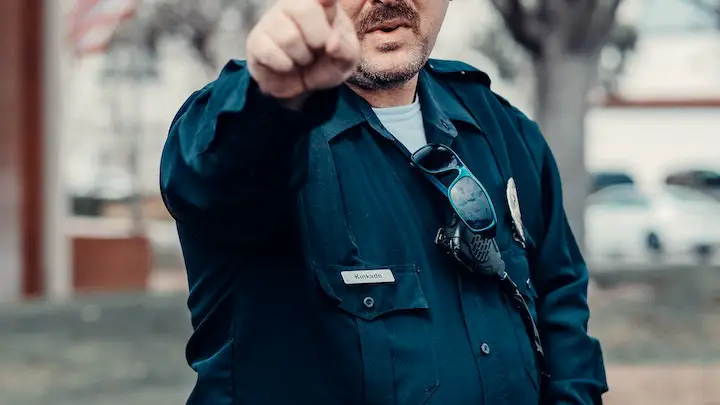As someone who intends to work with law enforcement, you must be wondering what a lateral police officer is all about. However, I have written this article for you to understand what this job position entails fully.
A lateral police officer is transferred from one police department to another, where experience, job knowledge, and ability will form the basis for the officer’s new salary.
In other words, a police officer can move to another department, provided they meet specific requirements.
This article will detail what a lateral police officer means, their job description, qualifications, salary, and more.
What is a lateral police officer?

A lateral police officer is an officer of the law transferred from one police department to another in a new location to keep performing the same duties.
They are often hired by larger departments that require an experienced officer with specific skills, qualifications, and training. Qualifications to become a lateral police officer vary from department to department.
Still, they generally involve having at least a year of prior law enforcement experience, passing certain tests and background checks, and having the necessary physical capabilities to carry out the duties of a police officer.
Important things to consider before applying
As a police officer that feels that the environment you are policing is untenable and wants a transfer, there are important points you must consider to avoid making a regrettable decision.
When determining the viability of another department before transferring, you can begin by gathering information online, checking the department’s website, and visiting the area in person.
Here are other important points you should consider before moving to another department:
1. The benefits attached
Most police departments offer experienced lateral police officers benefits such as vacation time and more pay to compensate for their years of experience.
In addition, some of these departments grant you promotional opportunities and a chance to move up the ranks.
Hence, you must consider the bonuses attached to the department you wish to move to and know if these benefits match your years of experience in the force.
2. The training methods
A police department that cares about its officer’s emotional, legal, and physical survival will always commit to quality and ethical training.
Hence, knowing the level of training required by your prospective department should be your major consideration, especially if you plan on moving there.
4. The living conditions
Before you seek a transfer to another police department, you must ascertain the living conditions there. You will need to know whether it’s a place you and your family can afford to live in.
What are the Duties of a Lateral Police Officer?
As a lateral police officer, your essential job duties include the following:
- Apprehending criminals
- Patrolling your assigned areas within the city either on foot or in the patrol vehicle
- Answering calls of all nature during assigned work hours
- Investigating crimes such as assaults, murder, robbery, and manslaughter
- Preparing and documenting evidence and appropriate reports
- Rendering assistance, emergency first aid, and other lifesaving methods to persons unable to help themselves or accident victims
How much salary do lateral police officers earn?
According to reports by GlassDoor, the estimated salary for a lateral police officer in the United States is $55,107 per year. This amount is divided into a base pay of $51,043 and an additional payment of $4,064 yearly.
The additional pay comes in various forms, including profit sharing, cash bonuses, and commissions.
What qualifications do you need to become a lateral police officer?
To become a lateral police officer, you must:
- Be 21 years of age
- Have a valid driver’s license
- Be a U.S citizen
- Have completed an AA degree from an acceptable university or college
- Possess a current basic law enforcement certification issued by the state where you attended the academy.
How to become a lateral police officer
The processes involved when applying to become a lateral police officer are as follows:
1. Submit an application
The first step towards becoming a lateral police officer is submitting your application online for review. However, you must be sure you have all the required certifications before applying.
2. Fill out the background forms
After submitting your application, you must fill out the department’s background packet and personal history form. When filing these forms, you must attach all supporting documents on the test date.
3. Attend the test
The test phase is the third step when applying for a switch from one police department to another. This phase is known as the physical agility test and consists of the following:
- A 500-yard run
- A 99-yard obstacle course
- Solid fence climbing
- Chain-link fencing
- Body dragging
4. Background and polygraph investigation
After you complete the physical test, the most qualified candidate(s) will be subjected to an extensive background investigation and polygraph test. The investigations will be based on your profile and your past behavioral conduct.
5. Medical examination
The police department conducts medical examinations to determine fitness, conditioning, and general health. The medical examinations will also include a drug test.
6. Psychological screening
A licensed psychologist will administer and evaluate psychological tests and conduct an in-depth personal interview to determine whether an applicant is a good fit for employment.
FAQs
What’s the difference between a lateral officer and a police officer?
A lateral police officer is a law enforcement officer transferred from one police department to resume work in another area.
On the other hand, a police officer is a law enforcement officer solely responsible for preventing crime within their city or town limits.
Which U.S cities pay more for lateral police officers?
Green River ($84,351), Atkinson ($84,131), San Francisco ($78,325), and Cool Valley ($77,767) are the cities in the United States that pay more for lateral police officers.
Conclusion
Applying for a lateral transfer as a police officer is one opportunity that gives you exposure and the chance to interact with different people while going about your daily routine of securing lives and properties.
However, to enjoy a smooth transition to your new department, you must have all the qualifications.
In addition, developing rapport, practicing safe patrol procedures, and understanding criminal law are all essential for the job.
Regardless of why you decided to become a lateral police officer, your performance must leave your colleagues in your new department satisfied and impressed rather than disappointed.
I hope you enjoyed this article. Read more informational articles on LMS Hero.
Thanks for reading.






